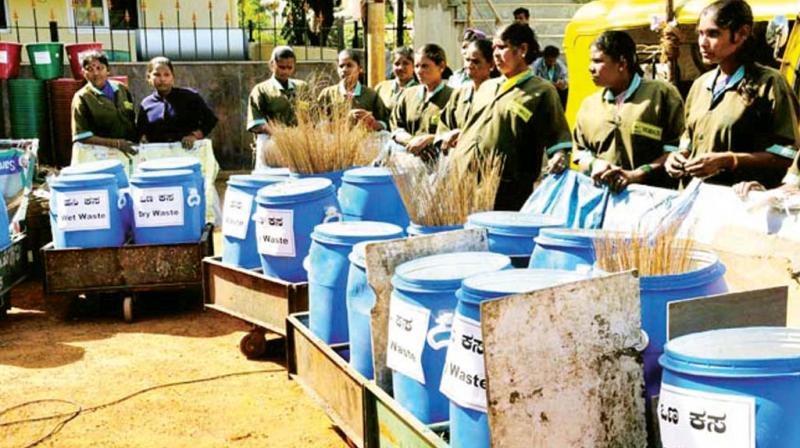Who's going to clean up your mess, BBMP?
How is hiring an army of watchdogs going to ensure that the city stays garbage-free.;

Why won’t Bengaluru’s garbage problems go away? All that the BBMP has to show for its efforts in recent years are a number of failed plans and eight landfills that are breeding grounds of pollution and disease. Carrying segregated waste to landfills and incinerators is still a distant dream. With the BBMP continuing to rely on pourakarmikas who are completely untutored in handling waste, how is hiring an army of watchdogs going to ensure that the city stays garbage-free.
The BBMP, which is constantly lamenting people’s reluctance to segregate garbage at source, is not doing enough to popularize the idea, believes urban evangelist,V Ravichandar, suggesting that it has many options to build awareness , from roping in school children to carry the message home to slapping fines on those who don’t fall in line.
The civic agency only needs to do the following to persuade more Bengalureans to segregate garbage at source, in his view.
- Rope in RWAs: BBMP should take the help of Resident Welfare Associations (RWAs) to reach out to people on the need for garbage segregation.
- Awareness programmes in schools: If school children are educated about garbage segregation, they will take the message home and demand their parents carry it out.
- Fine offenders: Once the BBMP creates enough awareness and gives time to people to fall in line , it should begin fining those who don’t segregate garbage at source.
- Shuchi Mitra: The BBMP , which plans to enroll ex-servicemen in fighting the garbage menace, could also re-introduce the old Shuchi Mitra scheme to monitor the segregation and disposal of waste.
- Install closed bins: The civic agency could install covered dustbins dedicated to wet and dry waste as in the absence of such a system for disposal of waste, those who miss the morning collection of garbage, often tend to throw it out on the streets , eventually creating a black spot. Based on the response to the trial run, the dustbins could be installed in all wards.
- Stricter new contracts: As some of the segregated waste gets mixed up by the contractors collecting it, the BBMP must in its new contracts ensure that they receive the waste in segregated form and it reaches the waste processing plants without being mixed up.
- Popularise Dry Waste Collection Centers: Steps must be taken to popularise the DWCCs and let people know that they can be used to deposit their dry waste. The fact that they can earn some money in the bargain, should also be highlighted.
There are many ways to ensure segregation is done at source: N.S. Ramakanth
Member of Solid Waste Management Expert Committee of the BBMP
A road map has been drawn by the BBMP to improve the percentage of segregation to a great extent in the next three months. At present, there is not much segregation actually taking place at the source and the BBMP is working toward setting things right.
In a meeting with the BBMP Mayor G Padmavathi and BBMP Commissioner Manjunath Prasad on Monday, I highlighted the possible options that the BBMP can consider to improve the percentage of segregation.
The main issue citizens face is that they segregate waste into wet and dry categories, but this is mixed up any way by the garbage collector or contractor, thereby defying the very purpose of segregation. The Palike is now charting out plans to avert mishaps like these, which are seriously de-motivating people from segregation at source.
Separate vehicles to transport wet and dry waste is a viable option, one that is being looked at by the BBMP. There is also a waste-segregation model in HSR Layout that runs very well, one that the state can examine closely.
Municipalities like Mumbai also have ‘clean marshals’, who catch people spitting and urinating in public places. The BBMP is planning to do something along similar lines, by hiring ‘litter marshals’ to enforce garbage segregation and catch people who dispose of their waste in public spaces, creating black spots across the city. The BBMP has many options at hand, it boils down to implementation.
Landfills contaminate groundwater, need to be treated
Villages located near landfills are forced to bear the brunt of Bengaluru’s waste generation, what with the foul smell that emanates incessantly from the landfills.
Leachate, the deadly liquid that oozes from garbage or waste has also seeped into the groundwater table, contaminating their water supply. Leachate contains numerous dissolved and suspended materials, including ammonia, which pose a serious threat to the environment.
Bengaluru’s garbage is being dumped in around eight landfills at the moment and no measures have been taken at any of these sites to prevent leachate from percolating into groundwater and thereby entering lakes in the vicinity.
Mr Chanappa, President of Kannahalli-Seegehalli Kasa Vilevari Horata Samiti said "Over 50 villages have been affected by the unscientific handling of waste at the Kanahalli waste processing plant. We depend on groundwater for drinking purposes. The leachate has also polluted Kenchanapura lake.”
The situation only worsens during the rains. Animals and aquatic life, which depend on the Kenchanapura lake are badly hit during the monsoon, Mr Chanappa added. “All complaints to officials have fallen on deaf ears and the BBMP has failed to contain the problem despite years of damage caused by leachate.”
When DC contacted BBMP commissioner Manjunath Prasad on the measures taken to treat the leachate, he said "We are closely working with experts exploring options for treating leachate with the help of microbes."
In cities like Nagpur, experts are already treating leachate through microbes. “We are exploring similar options here and once we are satisfied with the method, we seek approval and have it implemented across all landfills,” he added.

